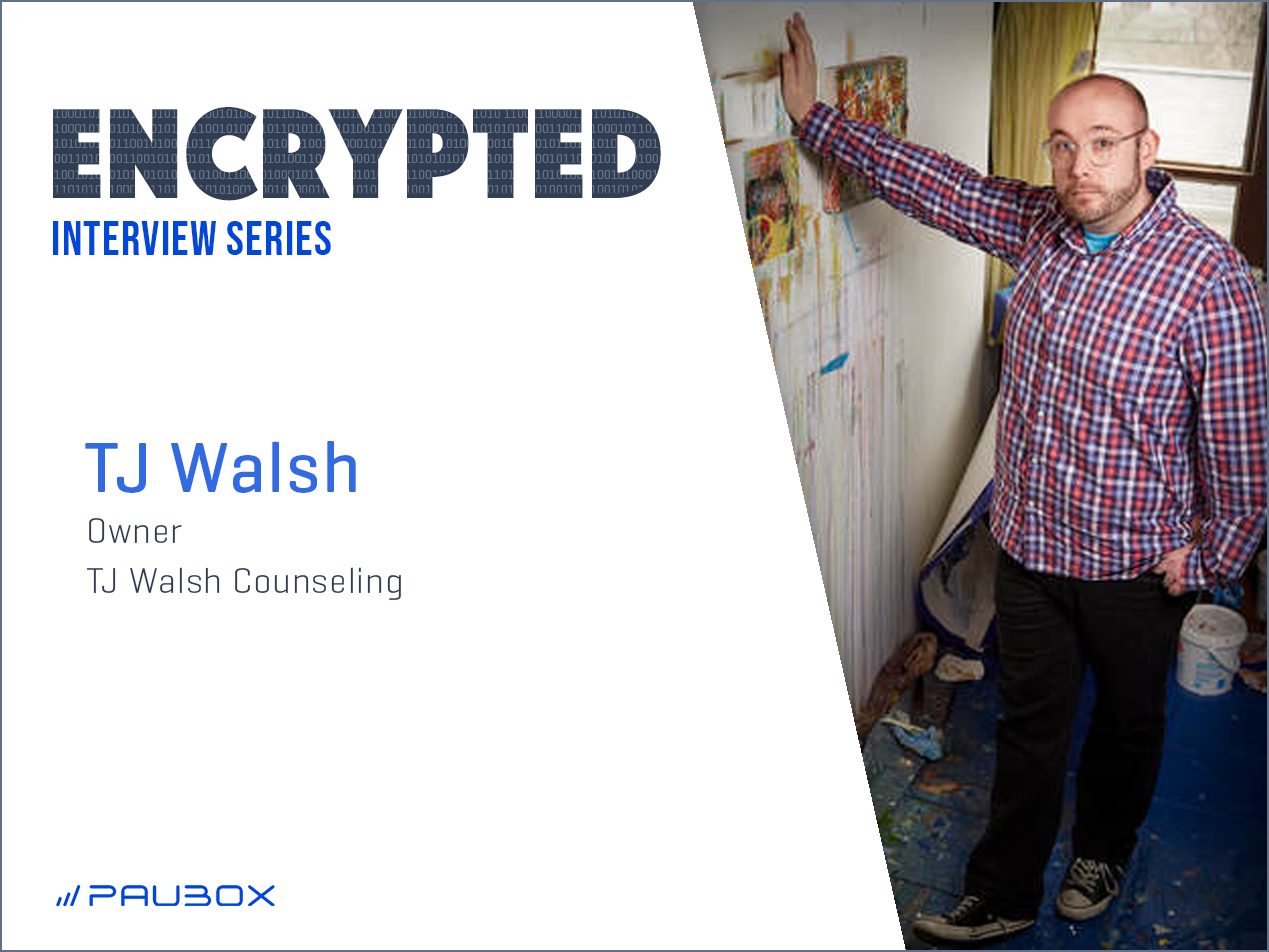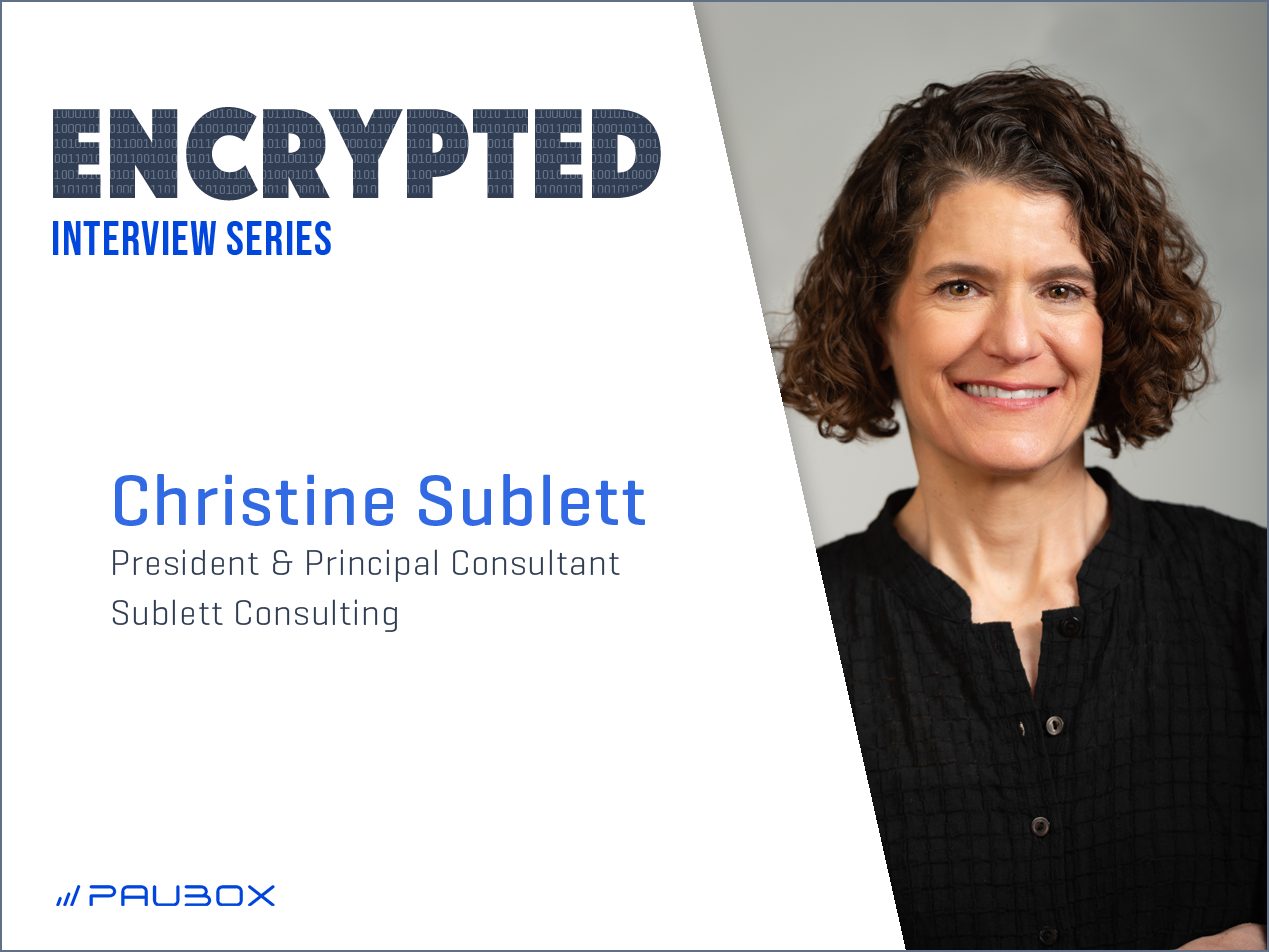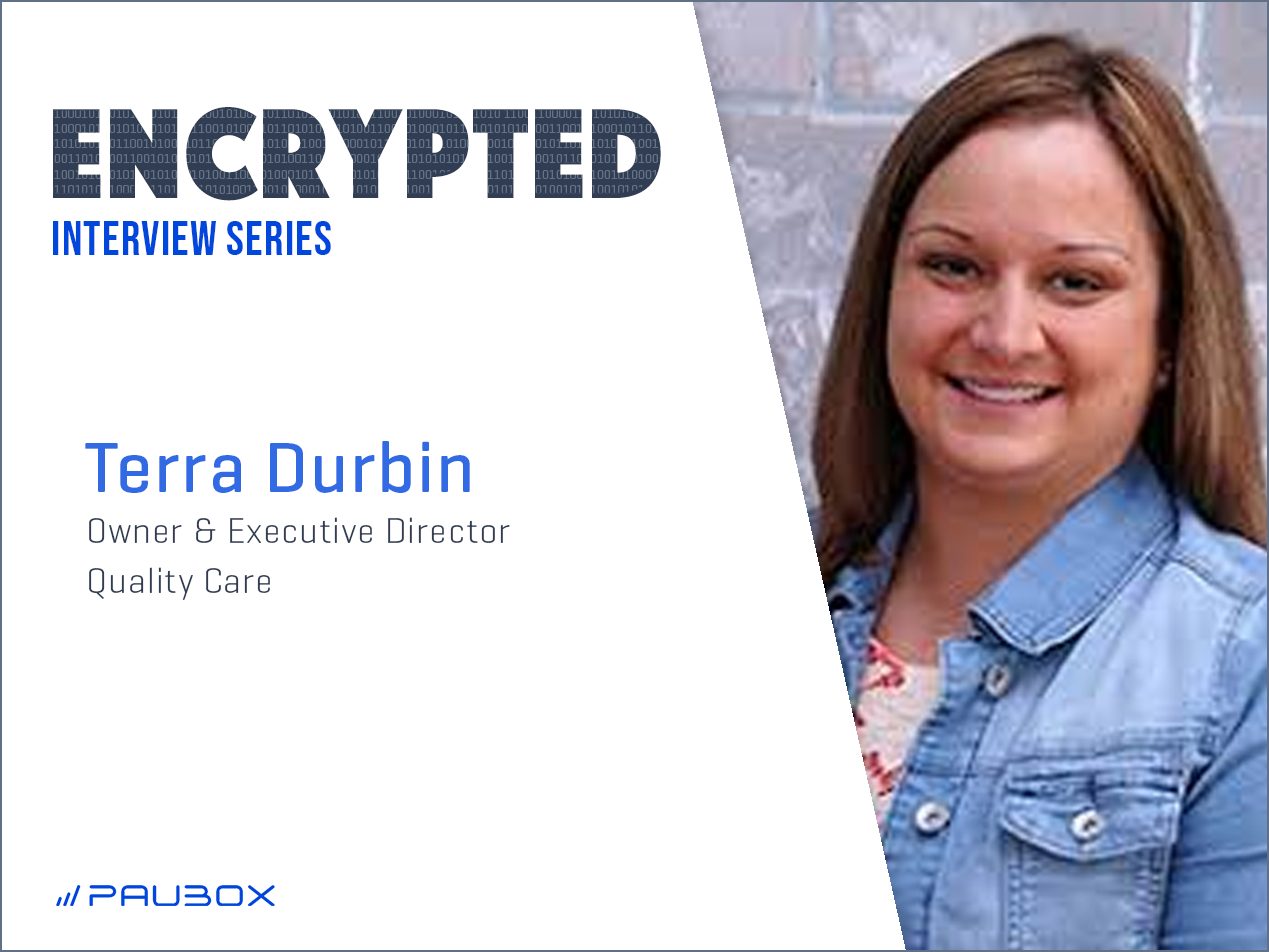8 min read
An interview with TJ Walsh: The impact of COVID-19 on therapy
Rick Kuwahara June 08, 2020

The Paubox Encrypted Interview Series allows us to chat with leaders in healthcare IT, compliance and cybersecurity to pick their brains on trends and best practices. In this Encrypted Interview, we chat with TJ Walsh , licensed professional counselor and psychotherapist, about the impact of the Coronavirus on therapy, and how the next generation is already removing the stigma of mental health.
Early career and professional growth
Rick Kuwahara: What led you to counseling as a profession?
TJ Walsh: My journey was a little bit windy. I started my career as a visual artist and then Creative Director for nonprofit organizations.
And I always found that in my meetings with clients, I was more interested in learning about the client and about their story, than I really was about learning about their product or the thing that they were trying to market.
So I decided that I wanted to pursue more training in the study of people and learning about people. I also thought that I would like to do something that I found to be helpful for me in my personal life.
And so I found counseling and psychology to be a perfect combination of those things, and I haven't looked back since.
Rick: How does your artistic background help you in counseling?
TJ: Yeah, that's a really good question. So it helps me in a few different ways.
One of the primary demographics that I work with are artists and creators of many forms of media. So I work with visual artists, I work with performing artists, I work with writers, and so my experience as an artist myself gives me a bit of an advantage because I naturally speak the language of makers and artists.
It also helps me, because as an artist, I'm super intuitive. I follow my gut with a lot of things. And I don't really get hung up with a bunch of like, "what ifs" or "should be's" when I'm trying to work with somebody that some other folks might.
Because I have learned through the specific process of creating that I follow in my artwork, to trust my gut and to follow an organic process.
And so I find that being able to do that, as a therapist, as a counselor, as a mentor, is super valuable in getting someone from point A to point B.
Rick: So what's been the challenge biggest challenge or mission, you know, as you started your practice?
TJ: I think for me, the biggest challenge is providing access to people who need counseling and therapy, while also providing them with the best service possible.
I say that's a challenge because usually people who need access to treatment or access to a helping professional are lower income, or they have more obstacles in the way of receiving care.
And so they tend to really want to use insurance. But I don't take insurance and I don't do that because I want to be able to provide my client with the highest quality of care possible, which typically means cutting out a third party so that my client and myself can actually work on the things that they want to work on.
So I've had to be creative in solving the challenge of providing access to clients who need it most. And giving them the quality of care that they deserve.
And so solving the challenge of price point has been something to overcome for my business.
My mission is to really help young couples, young individuals who happen to be creative and artistic, solve their interpersonal problems in a fast, effective and life changing way.
The coronavirus impact on therapy
Rick: So how has delivering services changed with the Coronavirus?
TJ: Yeah. So that’s, obviously, a really big important question for my field, in particular today. So the counseling profession, psychotherapy has been a really, really slow field to adapt over the course of its history.
It’s notoriously slow and frustrating, especially to providers who want to be more flexible and want to be more forward thinking in their delivery of therapy to clients. So the Coronavirus has forced change upon the counseling and psychotherapy profession really quickly. So quickly that it’s left many therapists who are risk averse or slower to embrace technological change. It’s left them kind of reeling a little bit.
The delivery of services has had to go online because we don’t have any safe or effectively safe means to provide care to folks in person anymore. Some therapists have to provide it in person still and generally those people are in like a hospital, or inpatient, or intensive outpatient setting, where online treatment is not recommended due to the challenges that that patient is facing.
But for the majority of us in private practice or outpatient settings, we’ve had to really quickly adapt to the fact that it’s not safe to be in person. And that’s meant to go online and to figure out how to deliver services securely to our clients without causing them concern, without putting us in undue risk as the provider.
Rick: Right. Do you see that move to telehealth and more virtual services as a potential benefit for the future?
TJ: Yeah, definitely. I do. I think, while I said a minute ago that the field of counseling and psychology has been slow to adapt, there have been over the past few years, folks in the industry who have been pursuing telehealth as a primary mode of delivery.
It has just been slow to catch on, both from the professional side and also the client side. I think now as we are seeing more people out of necessity coming online and receiving their therapy sessions today, that will hold an increase over the next months and years.
There’s always been some back and forth in the therapeutic community about whether or not telehealth, whether by telephone or a video conference, is as effective as an in-person mode of delivery. And the research shows that it’s actually just as effective.
And so, we can reassure our clients that the therapy that they’re receiving online is equally effective as the therapy that they receive in the room with us in person.
There are some cases where telemedicine is counter-indicated, meaning that for that particular person and their challenges, it may not be appropriate and then we have to figure something else out. But for the vast majority of clients who engage in private practice therapy or outpatient therapy, telehealth is just as effective.
Rick: That’s great, good to hear. I think, especially, of people who are maybe in more rural areas, especially, that could help.
TJ: Yeah. Yeah, definitely. It’s for sure a question of access, right?
Rick: Right.
TJ: And if one of the ways we can provide quality psychotherapy or quality counseling services to people who live at a distance from a city or a larger population base where the therapists tend to congregate through the use of online tools, then we should be doing that.
There is still the question about whether or not those more rural communities have access to high-speed internet, but that is also something that we see being tackled in the technology field as well as we’re growing.
Rick: Yeah. I know that’s why 5G is so exciting for a lot of people right now.
TJ: For sure, yeah.
Rick: To get to those areas. I think one thing that comes up with it, too is there’s still a lot of stigma around mental health and getting assistance. Even telehealth might help with that because you don’t have to walk to an office anymore.
TJ: Yeah. Over the past few years actually, we’ve seen the… Well, the type of clients that I work with, I should preface that this is all based on my experience and from my point of view. Other therapists, other people who work with different populations than I do, of course have their own experiences.
But from my experience, most of the people that I work with talk about their therapists and their therapy within their social circles.
So, we do see with more and more types of delivery platforms coming on the market for therapy, different types of openness with the younger generation about taking care of themselves.
Self-care, is of course this term that everybody throws around now, that the stigma of going to a therapist is reducing.
That’s not to say that the stigma around mental health challenges and diagnoses is changing very quickly, but at least the fact that your best friend goes to a therapist and so you shouldn’t be ashamed to go to a therapist either, is definitely changing.
We see platforms like BetterHelp and things of that nature really starting to change the conversation.
I’m not that kind of therapy provider, it’s just not what I do, but it definitely helps in terms of the visibility and reducing stigma of people who engage in therapy.
Rick: So it’s really great that that younger generation is really becoming more accepting of therapy. I know just anecdotally myself, you know, my wife is a high school teacher, and there are a lot of, I wouldn’t say… It might not be that there’s more issues, but just that they’re more aware of it now from when we are growing up, that there’s a lot of things that are pushing on the youth these days. There’s social media, the perception, like you said, self-care, how people view themselves, and there’s data that there’s more broken homes now. All these issues that are going on, I think that mental health is something that’s even probably more important growing up, to have that support.
TJ: For sure. For sure. Yeah, I think our youth are up against challenges that generations before them have not been up against.
Every generation has their challenge and have things that cause distress in their life. But this particular generation, I think the pressures of succeeding, of image management, of performing at a particular caliber when measured against their peers, is pretty immense.
We look at data around the use of social media in general, and we’re finding that people who use social media a lot are about 2.7 times more likely to be depressed than people who use social media more sparingly. And we see that for depression, we see that for anxiety as well.
The more you engage in social media, the more anxious and the more depressed you’re likely to be.
And so when we look at the younger generation, who your wife works with probably, or the kids in college, students in college, they’re on social media all the time. They’re checking social media tens of times a day, multiple, multiple times a day, they’re always on it.
And so if you’re constantly being fed an image of perfection, there’s going to be that expectation or pressure put back onto yourself to match that image of perfection. And so that’s what we’re seeing happening today.
And then also the type of parenting that happens in our culture tends to be very, very… Well, it can be two different ways.
It can be micromanaging and helicoptery, or it can be totally hands-off. Both of those ways are not helpful to the development of an individual.
And so being that we see students not being kind of directed in a healthy way, sometimes, we see them becoming more anxious and more depressed and more stressed out about success.
So yeah, social media, parenting styles and the culture at large today is really having an effect on the mental health of our youth.
Final Thoughts
Rick: How do you keep up with industry trends? Any good podcasts, blogs, influencers or newsletters that we should be following?
TJ: Yeah, definitely. I find that there are a few names of people in my industry who I listened to, but I also find it really helpful to listen to people outside of the therapy bubble.
Rene Brown is one, who is a social worker researcher who talks a lot about vulnerability and how important it is for people to become comfortable with being vulnerable. She's really started to change the conversation of what vulnerability is in our culture.
We've seen vulnerability as a negative thing, right? As a thing that you don't want to be. It shows weakness. But in reality, vulnerability is actually a sign of strength.
And Rene Brown's research and her teaching and therapy has started to change that narrative to say, in order for healthy relationships to take place we have to be willing to wade into the waters of vulnerability.
And show people the parts of ourselves that are the deepest parts of ourselves the most intimate parts of ourselves.
That's how we grow relationships and maintain strong relationships as human beings. So Rene Brown, I would definitely recommend she's an amazing author and amazing speaker.
The other person who I would really recommend for similar reasons Is Esther Perel, who is a marriage and family therapist in New York City. She has kind of made it big with her books over the past 10 years one is Mating in Captivity, another is State of Affairs.
The way she works with couples is amazing. And she has a podcast called Where Shall We Begin? where you actually hear her working with a real couple through challenges for an entire therapy session.
And listening to the way she works with these couples gives you an immense amount of information and insight to then start applying to your relationships as well.
So Rene Brown and Esther Perel are people that I would recommend for everyone to do a little Google search about and see what they find.
Rick: What do you do to de-stress and relax?
TJ: For me, it's really important to continue working on my painting.
I am lucky right now that I have an office on the bottom floor of my house where I see my patients in person when I can, though online now, and then on the top floor of my house I have a painting studio.
And it's so important that I maintain that practice because it is the way that I release energy. It's the way I get energy back and really process a lot of stuff.
And then physical activity is really important for me as well. So getting getting to the gym when I can is important
Subscribe to Paubox Weekly
Every Friday we'll bring you the most important news from Paubox. Our aim is to make you smarter, faster.





